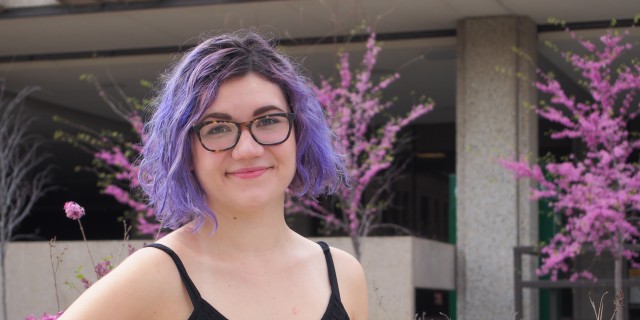Katherine Gwynn, B.A. in English and women, gender & sexuality studies, Class of 2015
As a double major in English and women, gender & sexuality studies, Katherine Gwynn is an advocate for opening up the conversation about women’s experiences.
“I’m really passionate about not treating women as a monolith in the arts or literature but really being able to get women of all different backgrounds and identities and histories to be able to write stories about women of that same breadth,” said Gwynn, an Olathe senior.
During her time as a University of Kansas undergraduate, Katherine Gwynn’s senior year has arguably been her most momentous. She started off the year as an organizer of the September Siblings, a movement to bring about changes in the university’s sexual assault policy, and she’s ended the year seeing her full-length Shakespearean spin-off play produced and performed.
The play Gwynn wrote this year, “Merely Players,” allows a relatively unknown female character named Phebe in Shakespeare’s “As You Like It” to tell her story. The Shakespeare play is one of the few with a dominant female lead, Rosalind. Gwynn saw the play performed at the Heartland Shakespeare Festival in Kansas City just after her return from KU’s British Summer Institute in 2013, where she saw other Shakespeare works performed at the Globe Theatre. Driving home after seeing “As You Like It,” Gwynn was struck by the treatment of Phebe, who is manipulated and tricked by Rosalind throughout the play.
“Throughout the course of the play, I thought, ‘What about Phebe?’ She’s the one character in the play who doesn’t get a happy ending,” she said. “I thought that’s really unfair. Why would Rosalind do that? What’s making that happen between these two? That’s when I wrote the first page of (the play).”
The representation of women on stage and screen has influence far beyond entertainment value, Gwynn said. Her niece, for example, has already taken notice of the roles women play in TV and movies.
“My niece and I had a really great conversation about how girls are represented, about how they’re not often put in the lead,” Gwynn said. “She’s 9 years old. I couldn’t have that conversation when I was 9 years old. Literature and the arts and theatre make a place where you can talk about that and enjoy it.”
Gwynn began writing “Merely Players” in earnest this fall as her senior honors thesis under the guidance of KU English professor and playwright Darren Canady. By spring, she had written a full-length play and it was selected to be produced and performed by the Jayhawk Initiative for Student Theatre. To have a work produced that is a full play and is written by an undergraduate is a rare accomplishment, Gwynn said.
“It’s been the best part of my KU experience here. Writing this play, getting all this support and see it really come to life. It’s what’s confirmed for me that I want to pursue playwriting as a career,” she said.
Gwynn plans to take a year or two off before applying to M.F.A. programs in playwriting. As she begins to consider next steps in her career, she said she’ll be drawn to opportunities that connect arts and empowerment.
She’s been an intern at the GaDuGi Safecenter in Lawrence, where she helped develop a creative writing art therapy curriculum for survivors of sexual assault. She was also president of SURGE (Students United for Reproductive and Gender Equity), which led her to become heavily involved in the September Siblings movement this fall. The September Siblings takes its name from the February Sisters, who in 1972 occupied a campus building to demand changes in women’s opportunities and services at KU.
The events of the September Siblings movement have been on Gwynn’s mind throughout the year. In addition to writing a play, interning, pursuing two majors and participating in student activism, Gwynn has also worked this year as a research assistant for Alesha Doan, chair of the Department of Women, Gender & Sexuality Studies. Doan tasked Gwynn with archiving the sexual assault activism and dialogue on campus to preserve the information for future generations of students and administrators. Gwynn is encouraged by the dialogue that started when students sought changes in KU’s policy on sexual assault.
“It was really fantastic to see people come together in a powerful way and to be concretely listened to. People were covering our stories and people were sharing their stories,” she said. “That was the most important part to me, that survivors were sharing their stories and sharing their voice. It was great to see us get momentum and get some concrete action started.”
As she’s looked for opportunities to help others tell their stories and find their voice, in the arts and in recovery from trauma, Gwynn said she’s found herself grow far more confident in her talent and what she has to say.
“All my friends and mentors are surprised when I bring up that in high school I was really quiet, and insecure and shy and didn’t speak up that much. Now in college, I’m known as being very loud, very extroverted, not shy to give my opinion,” she said. “I think that’s been due to the friends and mentors I’ve found here at KU.”
